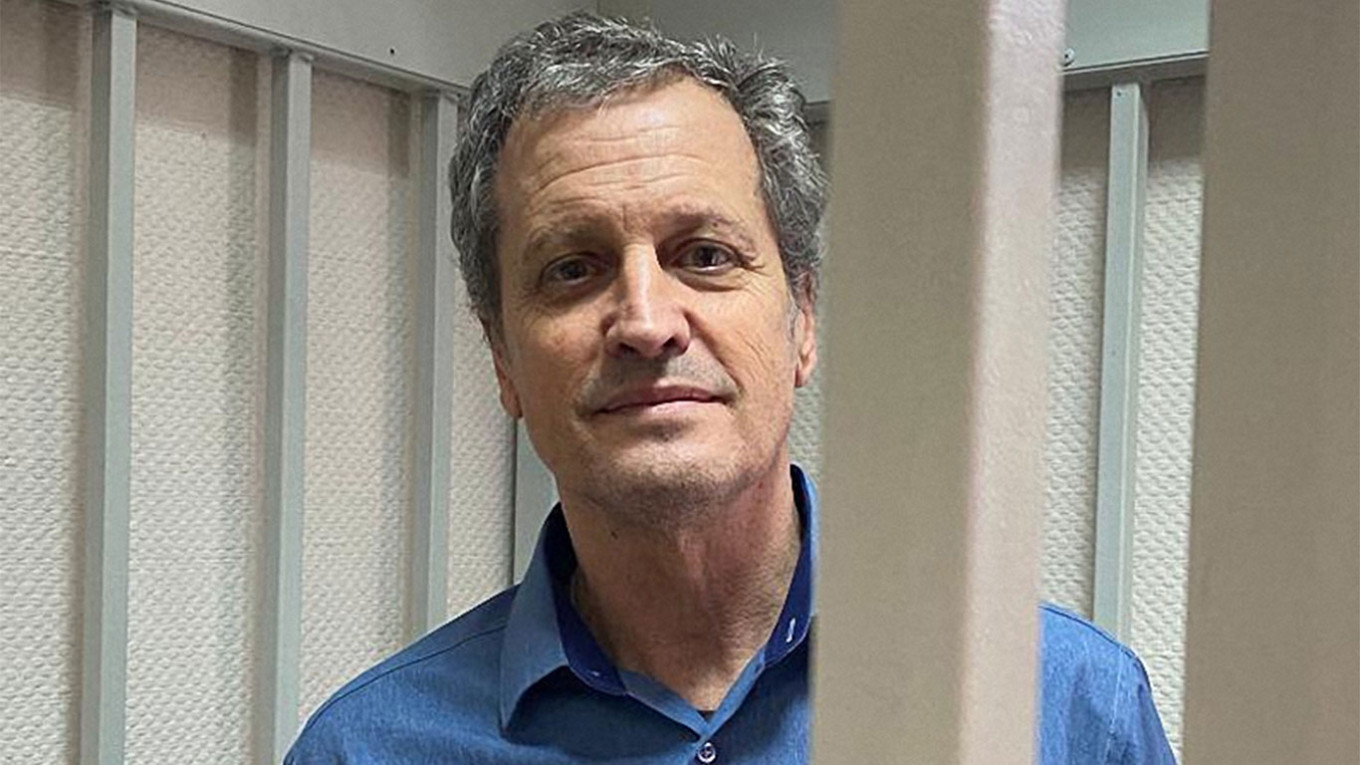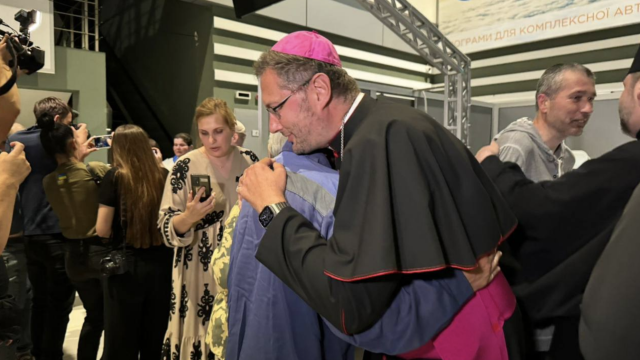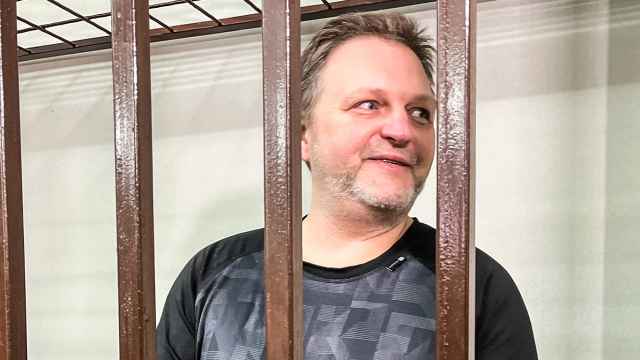Marc Fogel was my history teacher and softball coach at the Anglo-American School of Moscow. He has borne the brunt of deteriorating Russian-American relations for over 900 days since he was detained.
Like many, I closely followed Brittney Griner’s story, and immediately noticed that Mr. Fogel’s case and charges were nearly identical. Though I was relieved to learn that she was freed from an unjust nine-year prison sentence in Russia, my heart sank to learn that my former teacher was excluded from the December 2022 deal that secured her release.
I immediately felt a sense of ease upon first meeting Mr. Fogel in 2012. Perhaps it was his disarming smile or his infectious enthusiasm for living and learning. Maybe it was his affinity for storytelling, allowing him to weave seemingly random historical facts together to paint a picture of people and events that remain at the center of policy debates today. Or maybe it was simply the fact that he arrived in Moscow right around the same time as me.
He was known in our school for having an unstructured classroom setting, and inevitably won over even the most aloof students by fostering university-level debates in class. From our very first writing assignment, he encouraged students to challenge the assumptions underlying the question being asked. He would beam with delight when a student voiced a revisionist opinion about the Cold War, using it to guide much of the discussion that day.
He was equally encouraging when coaching the girls’ softball team. He made a point to empower us all as young women, and made everyone — regardless of skill level, which was fortunate in my case — feel that they belonged to the team and on the field.
His expectations for his students were high. Our tests involved explaining how dozens of people, policies and places were connected and their historical significance. He recommended that we memorize a myriad of quotes from key historians or primary source documents to use in timed essays.
One day, I remember him starting class with an uncharacteristically somber tone. He announced that he was taking an extended absence and returning to the U.S. for surgery due to his debilitating pain. This was the first time many of us had heard about his condition.
He explained how his slight lean forward — something I chalked up to him leaning in with interest toward whomever he was speaking with — was actually due to chronic pain searing into his lower back.
He did not talk about this for long, though, instead emphasizing that he would be back in the classroom (and on the softball field) as soon as possible. He also took the opportunity to warn us of the dangers of opiates, due to their addictive side effects.
Mr. Fogel’s lessons and guidance made a lasting impact on me. I credit him for inspiring my love of Russian history, which continues to shape my focus as I wrap up my graduate studies. It is amazing to know that I am just one of thousands of students he has taught and guided over his career.
It is clear that his commitment to his students and family prevailed over his chronic pain. But, as his family rightfully said, a 14-year prison term in a maximum-security Russian penal colony is like a death sentence to a 62-year-old with chronic back pain.
In spite of his situation, Mr. Fogel is continuing his role as a teacher by teaching fellow inmates English. The rare phone calls he is allowed with family revolve around him asking about them. When asked about how he is doing, they are met with “dead silence.”
Even by Russian standards, Mr. Fogel’s sentence is extreme. According to Article 228 of the Russian Criminal Code, possessing any form of drug or narcotic on an “especially large scale” is punished with a “deprivation of freedom” for 10-15 years. Allegedly possessing 0.6 oz of medical marijuana should fail to meet this criterion by a long shot.
To put Mr. Fogel’s sentencing in context compared to more extreme convictions, homicide is punished with a prison sentence of 6-15 years. Appallingly, this means that Mr. Fogel’s sentence is greater than those for some murderers. Furthermore, the Code’s euphemistic description of imprisonment in Russian penal colonies — infamous for their brutal conditions that are often likened to the gulags of the Soviet Union — as “deprivation of freedom” is laughable.
Over the years, punishments under Article 228 have grown harsher. Article 228 features a few qualifiers for what constitutes possession of narcotics and psychotropic substances. These include the terms “large scale” and “especially large scale.” Unsurprisingly, the article does not define these terms and conveniently, yet vaguely, states that these quantities are “approved by the Government of the Russian Federation.” This in turn allows sentencing to be loosely interpreted by the Russian judicial system, ensuring that punishments can be manipulated based on the state’s political motives.
Although drug use in Russia is a legitimate public health issue, Mark Galeotti notes that the state’s response has been “securitized” and “nationalistic.” Rather than prioritizing its citizens’ health, safety, and recovery, the government instead opts to use drug cases to target people that it perceives to threaten state power, from opposition activists to foreigners. In Mr. Fogel’s case, it simply targeted someone who would be a useful political pawn, at the expense of a kind and talented teacher who dedicated the last ten years to educating children in Moscow. It is painfully obvious that these subjective interpretations make it convenient for the Kremlin to use detained Americans as a leverage point, as it has done with Griner, Paul Whelan, Evan Gershkovich, and others.
As it currently stands, the Russian government cannot be trusted to treat its citizens — much less alleged lawbreakers — with equal and humane protection under the law. This has become even more apparent in the continued crackdown on civil liberties since its invasion of Ukraine.
Because of this, we can only hope that the State Department’s efforts to release Mr. Fogel and other detained Americans come to fruition. Until then, it is up to the American public to remain committed to raising awareness on their behalf. We cannot forget about the Marc Fogels of the world.
A Message from The Moscow Times:
Dear readers,
We are facing unprecedented challenges. Russia's Prosecutor General's Office has designated The Moscow Times as an "undesirable" organization, criminalizing our work and putting our staff at risk of prosecution. This follows our earlier unjust labeling as a "foreign agent."
These actions are direct attempts to silence independent journalism in Russia. The authorities claim our work "discredits the decisions of the Russian leadership." We see things differently: we strive to provide accurate, unbiased reporting on Russia.
We, the journalists of The Moscow Times, refuse to be silenced. But to continue our work, we need your help.
Your support, no matter how small, makes a world of difference. If you can, please support us monthly starting from just $2. It's quick to set up, and every contribution makes a significant impact.
By supporting The Moscow Times, you're defending open, independent journalism in the face of repression. Thank you for standing with us.
Remind me later.








